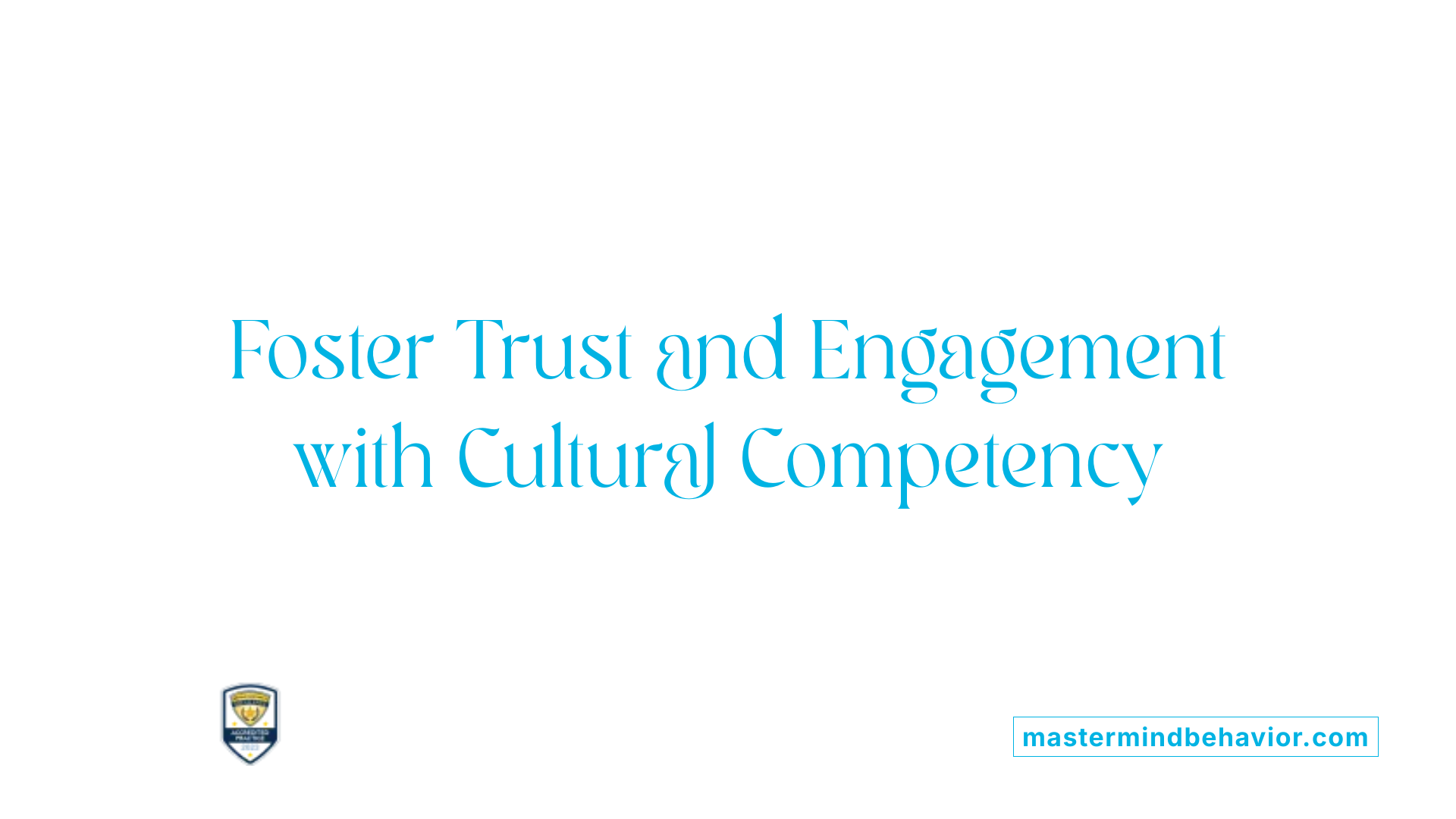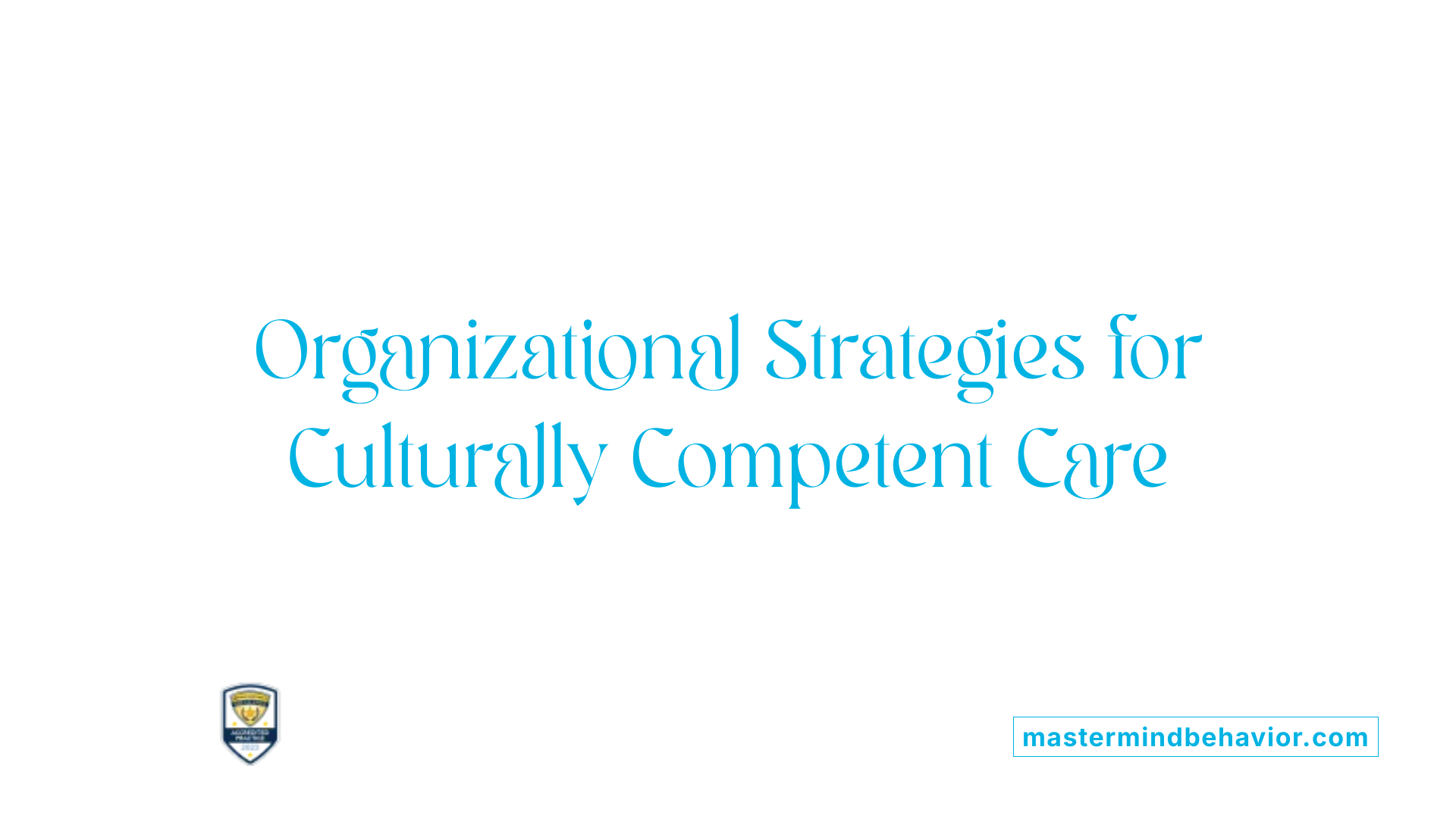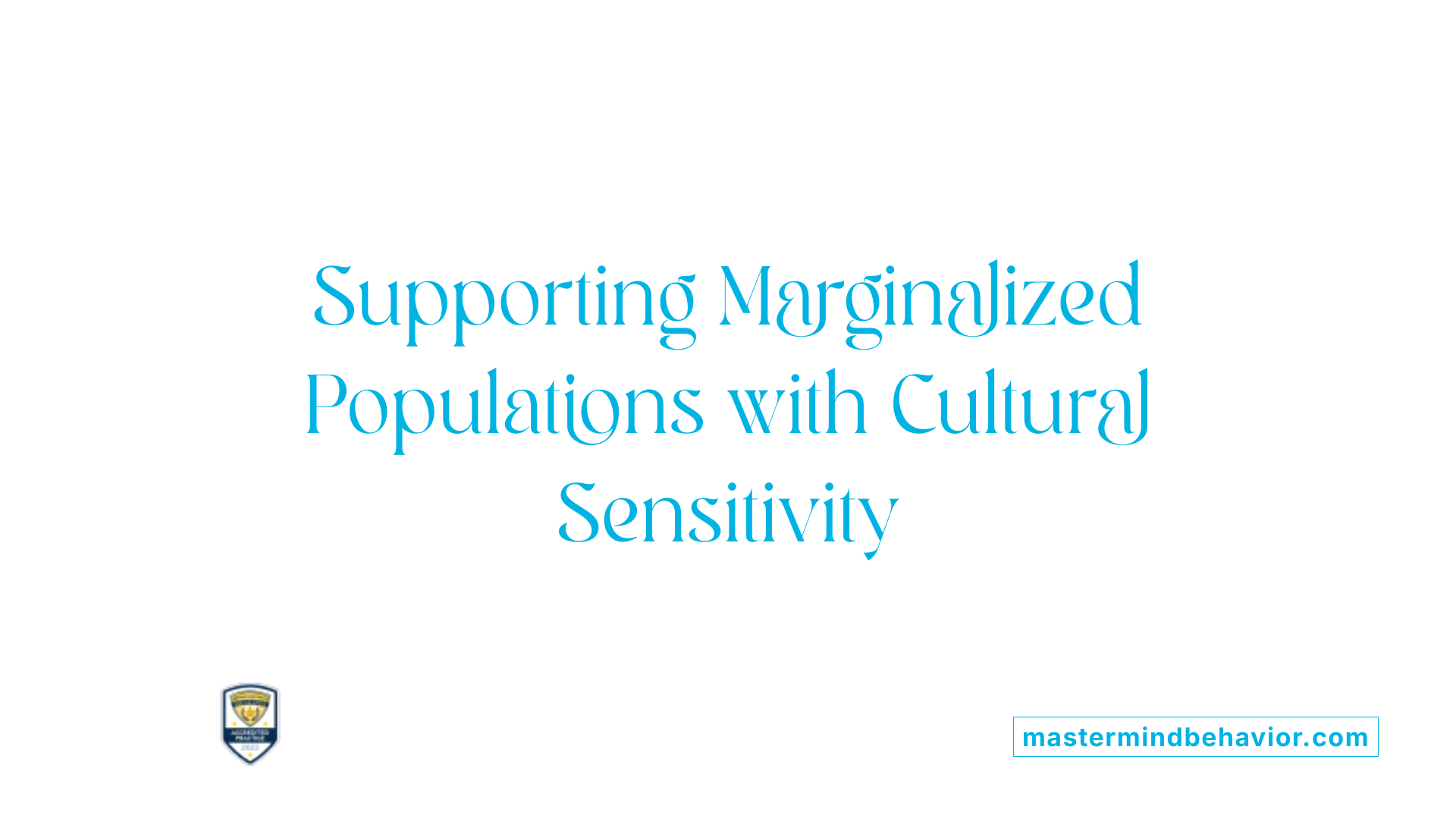Setting the Stage for Culturally Sensitive Behavior Therapy
As the landscape of mental health care becomes increasingly diverse, integrating cultural sensitivity into behavior therapy programs is paramount. Recognizing the vital role that cultural awareness plays in assessment, intervention, and ongoing practice, this article explores how therapists can adapt their methods to serve diverse populations effectively. From foundational principles to practical strategies, understanding the influence of culture can transform therapy into a more equitable and impactful discipline.
Fundamentals of Cultural Competence in Behavior Therapy
Why is it important to provide culturally sensitive interventions?
Providing culturally sensitive interventions is essential because they foster an understanding and respect for clients' diverse cultural backgrounds, beliefs, and values linked to race, ethnicity, gender, and other societal factors. Such sensitivity creates a foundation of trust within the therapeutic relationship, which is crucial for engagement and openness.
Culturally tailored approaches help therapists better understand the unique lived experiences of their clients, allowing them to adapt strategies accordingly. For example, recognizing clients’ cultural norms concerning communication, family dynamics, and attitudes toward mental health can influence treatment success.
Research indicates that when therapists develop cultural competence—an awareness of their own biases and an understanding of clients’ cultural contexts—treatment outcomes improve, particularly for marginalized or minority populations. These adjustments reduce misunderstandings, mitigate the effects of systemic oppression, and lead to more relevant, personalized therapy.
Overall, integrating cultural sensitivity into behavior therapy enhances equity and fosters more meaningful connections, resulting in higher engagement, better adherence, and more effective treatment overall.
Why is cultural sensitivity important in therapy?
Cultural sensitivity in therapy ensures that treatment respects and aligns with clients' cultural identities and worldviews. It acknowledges the profound influence that culture has on mental health, helping to understand how cultural norms, traditions, and values shape clients’ experiences, symptoms, and help-seeking behaviors.
When therapists are culturally sensitive, they build trust and reduce feelings of alienation, which are common barriers within diverse populations. This approach helps in addressing cultural stigmas, language differences, and intergenerational issues that may inhibit clients from seeking or continuing treatment.
In practice, culturally sensitive therapy involves learning about clients’ backgrounds, engaging in open discussions about cultural identities—including race, ethnicity, gender, sexual orientation, and socioeconomic status—and addressing systemic disparities. Such practices create a safe environment where clients feel validated and understood, thereby increasing engagement and improving therapeutic outcomes.
Furthermore, culturally grounded interventions are particularly effective in tackling systemic trauma, discrimination, and marginalization, which are often underlying factors in mental health issues among diverse groups. This promotes resilience, healing, and positive change, making cultural sensitivity an indispensable element of effective therapy.
Developing awareness of clients' cultural identities
Behavior analysts and therapists must develop a deep understanding of clients' cultural identities to craft effective interventions. Tools such as the ADDRESSING framework assist clinicians in exploring various facets of clients’ backgrounds, including ethnicity, age, disAbility, religion, socioeconomic status, sexual orientation, indigenous heritage, national origin, gender, and other influential factors.
In practice, this involves actively listening, asking culturally relevant questions, and incorporating clients’ cultural values into treatment planning. For example, understanding communication styles and family roles can influence how behavioral goals are set and achieved.
Clinicians should also utilize resources—such as culturally appropriate assessments and existing community-based programs—to enhance their awareness and integrate cultural considerations at every stage of therapy.
Recognizing the therapist's own biases and values
Self-awareness is fundamental for effective culturally competent practice. Therapists need to reflect critically on their own cultural identities, biases, and assumptions. Recognizing personal values and potential prejudices helps prevent these biases from influencing assessments and interventions.
Training programs should include education around privilege, systemic inequality, and differences within cultural groups. Creating safe supervisory environments and encouraging open dialogue about multicultural issues are essential for ongoing growth.
Additionally, ongoing self-reflection, professional development, and supervision can help therapists remain humble and adaptable—traits that underpin genuine cultural humility. This dynamic process enables practitioners to better serve diverse populations, fostering trust and improving treatment outcomes.
| Aspect | Focus | Importance |
|---|---|---|
| Cultural competence | Knowledge and skills | Enables effective and respectful therapy tailored to cultural contexts |
| Cultural humility | Self-awareness and openness | Encourages ongoing growth, reduces biases, and promotes client-centered care |
| Client cultural identity | Personal background | Guides personalized intervention planning |
| Therapist self-awareness | Reflection on biases and values | Prevents biases from affecting service delivery |
In sum, developing cultural awareness skills is an ongoing process that involves understanding clients’ cultural identities, recognizing one's own biases, and continuously updating practices to meet the diverse needs of clients. These efforts help create an equitable, respectful, and effective behavioral therapy environment.
The Impact of Cultural Factors on Treatment Outcomes

How do cultural considerations influence behavior therapy practices and outcomes?
Cultural considerations play a vital role in shaping therapy practices and their success. When behavior analysts and therapists incorporate clients' cultural backgrounds into their approach, interventions become more relevant and effective. Understanding clients’ cultural norms, language preferences, and familial values allows therapists to tailor strategies that resonate deeply with clients’ lived experiences.
For example, recognizing cultural contingencies—the ways behaviors are reinforced or punished within a particular cultural context—ensures that interventions are ethically sound and socially valid. The BACB’s ethical guidelines emphasize the importance of considering cultural factors to avoid biases and enhance treatment relevance.
Addressing barriers like implicit biases and employing open, respectful dialogue with families and clients fosters trust and improves collaboration. When treatment incorporates cultural sensitivities, clients are more likely to engage, leading to sustainable behavior change. Ultimately, culturally responsive practices help achieve outcomes that are not just effective but also ethically sound and aligned with societal norms, fostering meaningful change in diverse communities.
What impact do cultural factors have on the effectiveness of therapy?
Cultural factors significantly influence the success of therapy by affecting how clients perceive, disclose, and respond to treatment. Cultural values and norms determine how individuals interpret their symptoms and their attitudes toward mental health and interventions.
For instance, some cultures may favor collective approaches involving family or community, while others emphasize individual accountability. Recognizing these differences allows therapists to adapt their techniques, like psychoeducation or cognitive restructuring, to fit cultural expectations.
Barriers such as language differences, mistrust stemming from systemic marginalization, and trauma related to historical oppression can hinder communication and rapport. When therapists demonstrate cultural competence through ongoing education and engagement with cultural communities, they can enhance trust and treatment relevance.
Research indicates that integrating cultural understanding into therapy reduces disparities, improves satisfaction, and leads to better mental health outcomes for minority groups. Tailoring interventions to reflect clients' cultural backgrounds ultimately results in more effective and ethically responsible care.
How do cultural values and norms influence therapy?
Cultural values and norms guide how clients express distress, seek help, and engage with therapeutic processes. For example, clients from collectivist cultures may prioritize family involvement in treatment, whereas those from individualistic backgrounds might prefer privacy.
Understanding these cultural cues helps therapists interpret behaviors accurately and avoid misdiagnosis or miscommunication. For instance, somatic complaints may be more prominent in certain cultures as expressions of psychological distress.
Therapists can leverage this understanding by discussing cultural norms early in therapy, using culturally sensitive language, and respecting clients’ comfort levels with disclosure. Incorporating cultural practices or traditional healing methods, where appropriate, can enhance client trust and engagement.
By aligning therapy with cultural expectations, practitioners foster a safe space for clients to express themselves, leading to more meaningful progress.
Effects of systemic marginalization and systemic barriers
Systemic marginalization and barriers such as discrimination, socioeconomic challenges, and lack of access to culturally appropriate services adversely affect therapy outcomes. Marginalized groups—like racial and ethnic minorities, LGBTQ+ individuals, and those with disabilities—often face systemic obstacles that hinder engagement and trust.
These barriers can include language differences, lack of representation among providers, and limited availability of culturally tailored resources. Systemic oppression may also contribute to ongoing trauma, affecting mental health and complicating treatment.
To counteract these effects, organizations must implement culturally sensitive training, diversify staff, and foster community partnerships. For example, integrating traditional healing practices or offering multilingual services can help overcome systemic barriers.
Addressing these longstanding issues promotes equity, improves engagement, and enhances the overall effectiveness of treatment for marginalized populations.
The role of cultural expression and disclosure in therapy
Cultural expression and openness about one's identity influence how clients participate in therapy. Some cultures encourage open disclosure, while others emphasize silence or indirect communication.
Therapists should create environments that validate clients’ cultural expressions, acknowledging the significance of identity facets—such as ethnicity, gender, or sexual orientation—using frameworks like ADDRESSING.
Explicit discussions about identity and the impacts of systemic oppression can empower clients, validate their experiences, and enhance trust. For example, discussing the effects of microaggressions or systemic discrimination can unearth underlying issues impacting mental health.
Adapting therapeutic exercises—like cognitive restructuring or exposure—to incorporate cultural expressions ensures the approach respects clients’ backgrounds. This cultural tailoring fosters engagement, reduces alienation, and promotes authentic self-disclosure.
In summary, a nuanced understanding of cultural expression and openness enhances therapy's relevance and effectiveness, especially for those from marginalized communities.
Principles and Frameworks for Cultural Sensitivity in Behavior Therapy
What are principles and frameworks for implementing culturally sensitive behavior therapy?
Implementing behavior therapy that respects and incorporates cultural differences begins with core principles such as ongoing cultural awareness, humility, and competence. These principles encourage clinicians to understand their clients' unique cultural identities, including their values, beliefs, and lived experiences. Recognizing one's own biases and biases that may influence service delivery is crucial in preventing these biases from affecting client outcomes.
Frameworks like the Multidimensional Model for Developing Cultural Competence offer structured guidance for clinicians. This model emphasizes continuous development in cultural knowledge, skills, and awareness. The ADDRESSING framework is another valuable tool; it helps clinicians explore various dimensions of clients’ cultural and social identities such as ethnicity, age, gender, sexual orientation, and socioeconomic status. Incorporating these frameworks allows for a comprehensive assessment of cultural factors impacting clients.
Culturally responsive therapy also involves collaborative engagement, where respect for clients' cultural practices, traditions, and strengths guides the therapeutic process. This approach facilitates building trust, which is essential for effective treatment.
Adapting conventional techniques like Cognitive Behavioral Therapy (CBT) to fit clients' cultural contexts enhances relevance and effectiveness. For instance, a therapist might modify psychoeducation or exposure exercises to reflect clients' cultural norms or address systemic issues like discrimination.
Creating an environment of cultural sensitivity extends beyond individual therapy sessions. It involves self-education about multicultural issues, utilizing culturally relevant resources, and fostering organizational policies committed to diversity and inclusion.
In summary, the principles and frameworks for culturally sensitive behavior therapy emphasize understanding client diversity through structured assessment and integrating cultural practices into treatment plans. This approach enhances engagement, improves treatment outcomes, and promotes equity in mental health care.
Incorporating Cultural Sensitivity into Behavior Therapy Techniques
How can traditional CBT be adapted for cultural sensitivity?
Traditional Cognitive Behavioral Therapy (CBT) is effective across many populations, but adapting it to suit cultural backgrounds enhances its relevance and effectiveness. One approach involves tailoring components such as cognitive restructuring, exposure, and psychoeducation to align with clients' cultural values, communication styles, and belief systems.
Understanding clients’ norms around emotional expression, family dynamics, and help-seeking behaviors is crucial. For instance, some cultures may prefer indirect communication or prioritize collective family decisions over individual autonomy. Clinicians can incorporate culturally familiar metaphors, stories, and practices into interventions, making sessions more relatable and meaningful.
Addressing systemic issues like microaggressions and marginalization within therapy sessions also increases relevance. For example, discussing experiences of discrimination or societal bias as part of cognitive restructuring exercises can help clients process their lived experiences more effectively.
By grounding evidence-based techniques in the clients’ cultural realities—respecting their worldview while promoting behavior change—therapists create a more inclusive therapeutic environment. This adaptation promotes greater engagement, trust, and ultimately, better outcomes.
Using cultural knowledge to tailor interventions
Utilizing knowledge about clients’ cultural identities informs the customization of interventions. For example, incorporating clients’ traditional healing practices or community resources can enhance the receptiveness of therapy. Employing culturally appropriate communication styles and respecting cultural norms during psychoeducation also fosters rapport.
Explicitly discussing clients’ cultural backgrounds during assessments helps identify specific cultural strengths and challenges. This insight enables the therapist to modify exposure exercises to reflect culturally relevant scenarios or symbols.
By making these adjustments, therapists demonstrate cultural humility—an ongoing process of self-awareness and learning—that validates clients’ experiences and fosters a collaborative atmosphere.
Addressing systemic marginalization and microaggressions
Systemic marginalization and microaggressions profoundly impact clients’ mental health and treatment engagement. These issues should be openly acknowledged and addressed in therapy.
Therapists can normalize clients’ experiences of bias and discrimination, helping them develop coping strategies within the therapeutic process. Addressing systemic factors also involves discussing how societal injustices influence individual behaviors and mental health.
Integrating discussions about microaggressions, systemic barriers, and cultural identities helps clients feel seen and validated. It also informs the restructuring of maladaptive thoughts related to these experiences.
Overall, a culturally sensitive approach to CBT considers both individual and systemic factors, promoting empowerment and resilience through tailored interventions.
Building Trust and Engagement Through Cultural Competency

Why is understanding clients' cultural identities essential for therapy?
Understanding clients' cultural identities is fundamental for delivering effective therapy. When clinicians grasp the influence of a client’s ethnicity, gender, sexual orientation, socioeconomic status, and other aspects of identity, they can customize assessment and intervention strategies to align with the client’s cultural norms and values.
This tailored approach strengthens the therapeutic relationship by fostering rapport, trust, and a sense of safety. Clients who see their lived experiences and cultural backgrounds acknowledged and respected are more willing to openly share their thoughts and feelings. Such openness enhances the accuracy of assessments and the relevance of interventions.
Moreover, integrating cultural understanding helps address systemic barriers like microaggressions and marginalization that may impact mental health. When therapists consider these factors, therapy becomes more validating and accessible, increasing engagement and adherence. Incorporating cultural insights throughout the process creates a more genuine and respectful relationship, which significantly improves treatment outcomes.
What role does therapist self-awareness play in culturally sensitive practice?
Therapist self-awareness is a crucial element in providing culturally sensitive care. It involves recognizing one’s own cultural backgrounds, biases, assumptions, and privileges that may unconsciously influence clinical judgment.
By understanding their own cultural lens, therapists can prevent personal biases from skewing assessments or interventions. This awareness promotes ongoing cultural humility—a professional stance of openness, self-reflection, and willingness to learn from clients’ lived experiences.
Practicing self-awareness supports clinicians in creating an equitable, nonjudgmental space. It encourages open dialogue about cultural issues, reduces microaggressions, and fosters a sense of trust. Ultimately, higher self-awareness enhances the therapeutic alliance, boosts client engagement, and leads to more effective and fair treatment.
How does understanding clients' cultural identities improve therapy?
Recognizing and respecting clients’ cultural identities enables clinicians to develop more personalized and relevant treatment plans. It helps in understanding clients’ perspectives, behaviors, and responses within their cultural context.
This awareness allows therapists to adapt psychoeducational components, cognitive restructuring exercises, and exposure therapies to better fit clients’ cultural backgrounds. It also involves discussing marginalized statuses early in therapy to validate clients’ experiences and address barriers like systemic oppression or microaggressions.
Addressing these issues within therapy can alleviate related anxieties and improve overall engagement. Tailored interventions that incorporate clients’ cultural practices or beliefs enhance relevance and effectiveness, fostering a stronger commitment to treatment.
How do clinicians utilize community and cultural resources?
Integrating community and cultural resources into therapy enriches the intervention process. Utilizing existing community organizations, traditional healing practices, and culturally specific resources can make treatment more acceptable and effective.
For example, involving family members in a manner consistent with cultural norms, using multilingual resources, or collaborating with traditional healers can strengthen trust and engagement. Providing therapy in clients’ preferred languages and respecting cultural health practices demonstrates genuine cultural sensitivity.
Clinicians can also participate in community outreach efforts and ongoing cultural competence training to stay informed and respectful of diverse backgrounds. This integration not only improves clients’ comfort and connection to therapy but also promotes broader community well-being.
Incorporating these principles into practice
| Practice Area | Strategies | Impact |
|---|---|---|
| Therapist Self-awareness | Reflective practices, training, supervision | Reduces biases, enhances cultural humility |
| Open Dialogue | Early conversations about cultural identities, microaggressions | Builds trust, clarifies client experiences |
| Community Resources | Collaborations, language services, cultural adaptations | Improves engagement, relevance, and outcomes |
These approaches collectively foster a culturally competent environment where clients feel valued and understood. By continuously expanding their cultural awareness and humility, behavior analysts and clinicians can deliver more equitable, effective, and respectful care tailored to diverse populations.
Implementing Organizational and Professional Strategies

What are best practices for integrating cultural awareness into therapy settings?
Integrating cultural awareness into therapy is essential for delivering effective, respectful, and relevant services. The most successful approaches involve continuous learning and self-reflection. Therapists should participate in ongoing cultural competence training, which helps them recognize and challenge their own biases and understand the diverse backgrounds of their clients.
Creating a foundation of culturally informed assessments is also critical. This means evaluating clients with tools that consider their unique cultural identities, including communication styles, norms, language preferences, and lived experiences. Such assessments help tailor interventions that resonate with clients’ cultural values.
In therapy, adapting treatment strategies to be culturally sensitive improves engagement. This includes involving clients in planning their treatment, validating their cultural experiences, and utilizing their strengths and resources—such as community ties, traditional practices, or spiritual beliefs.
Practitioners should practice cultural humility—an ongoing process of self-awareness and openness to learning about clients' cultures. Consulting relevant literature, engaging in dialogue with colleagues, and actively seeking out culture-specific knowledge bolster responsiveness.
A respectful service environment fosters trust. Therapists should acknowledge intersecting identities that influence clients’ experiences, and create a space where clients feel safe and validated. Overall, integrating these practices enhances the therapeutic alliance and leads to better outcomes.
How can organizations institutionalize cultural competency?
Organizations committed to culturally competent care need to embed these principles into their structures and routines systematically. First, they should incorporate cultural awareness training into regular professional development programs for all staff members. This ongoing education ensures staff stay updated on multicultural issues and best practices.
Establishing clear policies that promote diversity and inclusion signals top-level commitment. Developing standardized protocols, including culturally informed assessment tools and intervention guidelines, supports consistency in service delivery.
Fostering an environment of continuous learning is vital. Supervision and peer consultation sessions should regularly focus on multicultural challenges encountered during practice. Safe spaces for open discussion about barriers, biases, and experiences related to cultural sensitivity help staff grow and reflect.
Partnerships with community organizations and stakeholders can enrich organizational resources and relevance. These collaborations facilitate access to culturally specific resources, community insights, and feedback.
Monitoring and evaluating outcomes are crucial for growth. Regularly collecting client feedback and analyzing service effectiveness through culturally sensitive metrics enable organizations to adapt practices proactively. This cyclical process of assessment and improvement ensures sustained organizational commitment to diversity and inclusion.
Additional Strategies for Enhancing Cultural Competence
| Strategy | Action Steps | Expected Outcomes |
|---|---|---|
| Staff Training | Continuous education, workshops, and self-assessment | Increased awareness, reduced biases |
| Policy Development | Inclusive policies, protocals, guidelines | Consistent, respectful services |
| Community Engagement | Partnerships, outreach programs | Culturally relevant services |
| Supervision & Peer Support | Regular case discussions, feedback | Reflective practice, skill development |
| Evaluation & Feedback | Client surveys, outcome measures | Improved quality of care |
How do these practices impact service delivery?
When organizations and clinicians actively embed cultural awareness into their work, the effects are significant. Clients experience a greater sense of respect, validation, and understanding. This fosters trust and enhances engagement.
Culturally tailored interventions tend to be more effective, with clients more likely to adhere and benefit from therapy. Clinicians become more competent in navigating complex social and cultural dynamics, leading to more accurate assessments and relevant interventions.
Ultimately, adopting these practices reduces health disparities, promotes equity, and ensures that diverse populations receive the quality of care they deserve.
By combining ongoing training, organizational policies, community partnerships, and reflective supervision, behavior analysts and healthcare organizations can create an environment that genuinely respects and integrates cultural diversity. This comprehensive approach improves outcomes and contributes to a more inclusive, effective healthcare system.
The Role of Education and Continuing Professional Development
Why is ongoing training essential for developing cultural awareness?
Continual professional development is crucial for behavior analysts and therapists working with diverse populations. As cultural norms and societal contexts evolve, so too must practitioners' understanding of cultural differences. Ongoing training helps clinicians stay informed about new research, cultural practices, and systemic issues that influence behavior and mental health.
Regular educational modules promote self-reflection on personal biases and expose practitioners to effective strategies for culturally responsive service delivery. This proactive approach ensures that assessments and interventions are respectful of clients’ unique backgrounds, thus improving engagement and outcomes.
What modules are included in training on multicultural competence?
Training modules typically cover a wide range of topics, including:
| Module | Focus Area | Details |
|---|---|---|
| Cultural Awareness Principles | Understanding cultural identity and bias | Exploring personal biases and cultural humility |
| Communication Styles and Norms | Navigating language, gestures, and communication preferences | Tailoring assessments and interventions to communication norms |
| Systemic and Structural Considerations | Impact of systemic oppression and societal structures | Recognizing microaggressions and systemic barriers |
| Trauma-Informed Cultural Practices | Addressing trauma within cultural contexts | Incorporating culturally sensitive trauma and resilience approaches |
| Incorporating Traditional Healing Practices | Respecting cultural healing methods | Blending traditional practices with evidence-based therapies |
These modules create a foundation for culturally competent care and are integrated into ongoing training programs.
How can theory and practice be effectively combined?
Successful professional development connects theory to real-world application through interactive case studies, supervised practicum, and reflective exercises. This approach allows clinicians to practice new skills in a safe environment, receive feedback, and refine their approach.
For example, role-playing scenarios with diverse client profiles help illustrate how cultural factors influence therapy. Supervision sessions that focus on cultural cases enable clinicians to discuss challenges, biases, and solutions.
Moreover, integrating self-assessment tools and peer discussions encourages continuous learning and cultural humility. Over time, these practices embed cultural considerations into routine therapy, making it a natural part of clinical work.
How do best practices look in real-world therapy settings?
In practice, best practices include:
- Conducting culturally informed assessments early in treatment.
- Validating clients’ cultural experiences and integrating their resources.
- Adjusting therapy components, like CBT techniques, to align with clients' cultural values.
- Maintaining self-awareness and openness to learning from each client’s unique perspective.
At organizations like the Ikon Recovery Center, these practices are exemplified through multilingual services, trauma-informed approaches, and community engagement.
| Practice Area | Description | Expected Outcome |
|---|---|---|
| Cultural Evaluation and Planning | Incorporating cultural identity assessments into treatment planning | Increased trust and personalized care |
| Therapist Self-Reflection | Ongoing review of personal biases and biases within the therapy process | Enhanced cultural humility and responsiveness |
| Community and Family Involvement | Engaging clients’ community and family resources as part of treatment | Greater cultural relevance and support network strength |
| Use of Culturally Adapted Materials | Employing culturally relevant intervention tools and resources | Improved client engagement and adherence |
Such practices ensure that cultural awareness is not a one-time focus but an integral part of ongoing professional growth, leading to more equitable and effective services.
Addressing Systemic and Microaggressions in Therapy

How do cultural considerations influence behavior therapy practices and outcomes?
Cultural factors play a vital role in shaping behavior therapy practices and their effectiveness. Tailoring interventions to accommodate clients’ cultural norms, beliefs, and practices ensures that therapy remains relevant and respectful of their backgrounds. When behavior analysts understand the importance of language preferences, family dynamics, and cultural contingencies, they can design strategies that resonate more deeply with clients, leading to greater engagement and better outcomes.
Ethical standards from organizations like the BACB emphasize the need to consider cultural influences during assessments and interventions. This helps prevent misunderstandings and biases that could hinder progress. Addressing barriers such as implicit biases or lack of cultural awareness enhances trust and collaboration between therapists and clients.
Involving families and communities through open, culturally sensitive dialogue can strengthen the therapeutic alliance. By applying culturally responsive methods, therapists can develop more effective, sustainable interventions that truly reflect clients’ lived experiences. Ultimately, considering cultural factors not only improves the validity of treatment but also promotes social validity—making behavioral changes meaningful and lasting within diverse populations.
Cultural Sensitivity and Marginalized Populations

Why is it important to understand clients' cultural identities essential for therapy?
Understanding clients’ cultural identities is a cornerstone of effective therapy, especially when working with marginalized populations. It enables clinicians to tailor both assessments and intervention strategies to align with each individual’s cultural background. This tailored approach fosters a sense of safety and trust, which are crucial for meaningful engagement in therapy.
When clients feel acknowledged and respected in their cultural experiences, norms, and values, they are more likely to open up, share relevant information, and remain committed to treatment. Recognizing the influence of cultural identity also helps therapists address systemic barriers such as microaggressions, systemic marginalization, and societal stigma that can obstruct therapeutic progress. Incorporating cultural considerations throughout the therapeutic process results in a more genuine, respectful, and responsive relationship, ultimately leading to improved treatment adherence and positive outcomes.
What role does cultural humility play in supporting marginalized clients?
Cultural humility is essential for clinicians working with marginalized populations. It involves ongoing self-reflection and a genuine desire to understand each client’s unique cultural background and lived experiences. Unlike cultural competence, which focuses on gaining knowledge, cultural humility emphasizes an attitude of openness, curiosity, and partnership.
This approach allows therapists to navigate complex issues related to systemic oppression, microaggressions, and historical trauma. By practicing humility, clinicians avoid stereotyping and validate clients’ identities, fostering trust and empathy. It encourages a collaborative development of treatment plans that respect clients' cultural values and preferences.
Practicing cultural humility promotes a more equitable and validating therapeutic relationship, crucial for engaging marginalized clients effectively. This ongoing process of learning and reflection not only improves the therapeutic alliance but also enhances engagement and treatment outcomes.
Fostering a Culturally Informed Therapeutic Practice
Incorporating cultural sensitivity into behavior therapy is not merely an ethical obligation but a practical necessity that enhances treatment effectiveness, engagement, and client satisfaction. By understanding and respecting diverse cultural identities, addressing systemic barriers like microaggressions, and adopting frameworks such as ADDRESSING, therapists can create more inclusive and responsive treatment environments. Ongoing education, organizational commitment, and self-awareness are essential to cultivating cultural humility and competence. Ultimately, culturally informed behavior therapy is a vital step toward equitable mental health care that honors every individual's unique cultural context, promotes systemic change within clinical practice, and leads to better outcomes for diverse populations.
References
- Developing the Cultural Awareness Skills of Behavior Analysts - PMC
- Enhancing the Cultural Sensitivity of Cognitive Behavioral ...
- Cultural sensitivity in clinical practice and training
- Cultural Sensitivity in Behavioral Addiction Care - IKON Recovery
- Cultural influences in mental health treatment - PMC
- Why Is Culturally Sensitive Therapy Important? - Quality Interactions
- How Culture Affects Therapy - Humantold
- Cultural Diversity in Counseling: Challenges & Opportunities
- Why Finding a Culturally Sensitive Therapist is Important - Talkspace
- Identity and Cultural Communities - Talkspace





